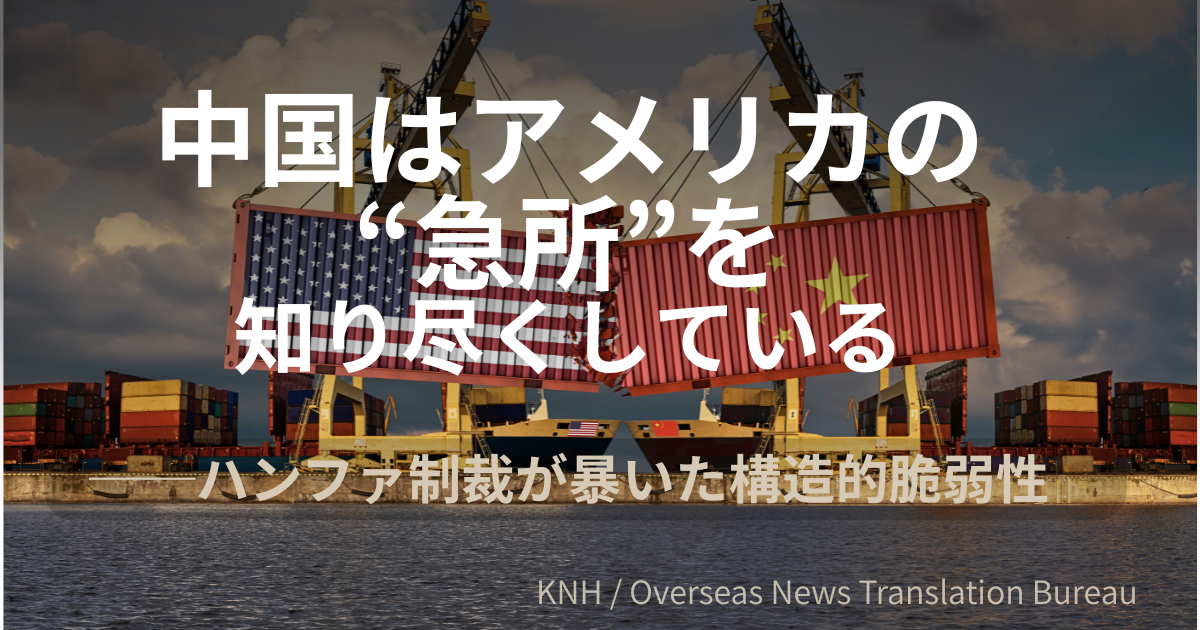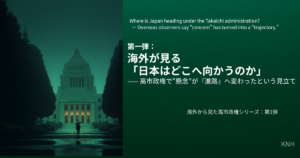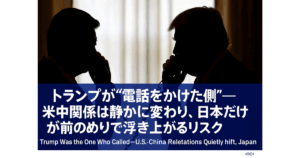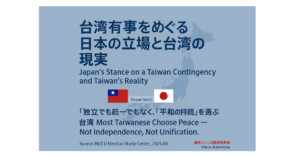中国は「アメリカのどこを突けば最も効果的か」を異常なレベルで理解している──ハンファ制裁が暴いた冷酷な現実
ハンファ制裁は単なる“対立の一幕”ではない。中国がアメリカの産業・物流インフラの急所をどれほど深く理解しているかを示す、象徴的な出来事だった。
日本にはいまだに、「強気で言えば中国は引く」「圧力をかければ怯む」といった昭和的な対中観が残っている。しかし、今回のハンファ制裁と制裁停止の一連の流れは、この発想がどれほど危険かを浮き彫りにした。
中国はいま、声を荒らげる必要はない。相手の“構造的弱点”を熟知しているため、軽く急所を押すだけで十分な効果が得られる。アメリカですら例外ではない。
■ Reuters が報じた事実──しかし本質はその先にある
【引用元:Reuters(Nov 10, 2025)】
中国商務省は、米中対立のエスカレーションを避けるために、Hanwha Ocean の米国子会社5社への制裁を1年間停止すると発表した。これらの企業はわずか1ヶ月前に制裁対象に指定されたばかりだった。
対象企業:
- Hanwha Shipping
- Hanwha Philly Shipyard
- Hanwha Ocean USA International
- Hanwha Shipping Holdings
- HS USA Holdings
表面的には「緊張緩和」のように見える。だがこれは、中国がアメリカの急所を一瞬押しただけで、ワシントンが静かに後退したという構図にほかならない。
■ アメリカの造船インフラは“国家のアキレス腱”
アメリカの造船業は壊滅状態にある。かつて世界2位だった造船能力は今や事実上消滅し、稼働中の主要な商業造船所は実質ひとつのみになっている。
その最後の命綱が、韓国 Hanwha グループ傘下の Hanwha Philly Shipyard だ。アメリカは造船インフラの基盤を外国企業に依存するしかなくなっている。
中国は当然、この構造的脆弱性を把握している。だからこそ、制裁対象にこの企業群を含めた瞬間、アメリカは緊張せざるを得なくなった。
■ アメリカ物流の「46%」が浅喫水船に依存する異常事態
アメリカ東海岸の港湾の多くは“浅い港”であり、巨大コンテナ船が入れない。結果として、浅喫水船(Hanwha が建造可能)に物流が依存する体制になっている。
この構造そのものが、アメリカの最も致命的な急所だ。
中国はこれを完璧に理解していた。だからこそ、ハンファ制裁という“わずか一撃”で、アメリカは後退を余儀なくされた。
■ トランプ政権の「産業回帰ショー」は本質的には空洞
トランプ政権は「製造業復活」「造船業の国内回帰」を掲げているが、これはほとんどショーに近い。
- 設備投資不足
- 労働者不足
- 補助金不足
- 法規制による遅延
中国はこの虚構を見抜いたうえで、もっとも効果的な一点を押した。
■ 中国の戦略──感情ゼロ、構造100%
中国は、国際政治において“声を大きくする”必要がない。代わりに、相手の産業構造・サプライチェーン・依存関係を徹底的に読み、一点突破で最大の効果を得る。
これは軍事行動よりもよほど怖い戦略だ。
■ 日本への警告──精神論外交は最も危険
今回の出来事は、日本にとっても痛烈な警告だ。 「毅然とした態度」や「強気の発言」は中国相手には何の意味も持たない。
必要なのは感情ではなく、構造の理解である。 自国の弱点を知らない国ほど、他国にとって扱いやすい。
中国はアメリカの急所を理解している。 当然、日本の急所も理解している。
📚 参考資料(外部リンク)
- Reuters「China takes steps against US-linked units of S.Korea shipbuilder Hanwha Ocean」
- Reuters「China’s sanctions against US-linked Hanwha units seen as warning gesture – analysts」
- SCMP「China-US shipping dispute deepens as Beijing sanctions subsidiaries of South Korean giant」
- Politico「‘Make American Shipbuilding Great Again’: Korea leans into shipbuilding as it woos Trump」
China understands America’s pressure points with surgical precision
Japan often assumes that “talk tough and China will retreat.” The Hanwha sanctions incident reveals how dangerously outdated this belief is.
China does not raise its voice. It does not rely on emotion. Instead, it studies structures—industrial, logistical, political—and identifies the single point where minimal pressure produces maximum impact.
■ What Reuters reported — but the real story lies beneath
Source: Reuters (Nov 10, 2025)
China announced a one-year suspension of sanctions against five U.S.-linked subsidiaries of Hanwha Ocean. These companies had been sanctioned only a month earlier.
■ America’s shipbuilding industry: a hollow core
The United States—despite being a military superpower—has allowed its commercial shipbuilding capacity to collapse. Only one major yard is effectively operational, and it is owned by South Korea’s Hanwha Group.
China understands this structural weakness better than many U.S. policymakers do.
■ 46% of U.S. logistics depend on shallow-draft vessels
Because many U.S. East Coast ports are too shallow for large vessels, the country relies heavily on shallow-draft ships—precisely the category Hanwha specializes in.
By targeting Hanwha’s U.S. subsidiaries, China did not need to escalate militarily. It merely touched a point that could cripple half of America’s logistics.
■ Structural leverage, not emotional escalation
China’s strategy is not about aggression. It is about understanding the architecture of power—and applying pressure at the exact right node.
This is why even the United States quietly stepped back.
■ For Japan: the era of loud diplomacy is over
Japan must learn from this episode. “Being firm” or “showing resolve” carries no weight against a country that operates on structural intelligence.
If China understands America’s weak points, it certainly understands Japan’s.
📚 References (External Sources)
- Reuters: “China takes steps against US-linked units of S.Korea shipbuilder Hanwha Ocean”
- Reuters: “China’s sanctions against US-linked Hanwha units seen as warning gesture – analysts”
- South China Morning Post: “China-US shipping dispute deepens as Beijing sanctions subsidiaries of South Korean giant”
- Politico: “‘Make American Shipbuilding Great Again’: Korea leans into shipbuilding as it woos Trump”







コメント
コメント一覧 (2件)
先日、知人と中国の工業製品のアフターサービスと営業力の話をして出た結論「日本のメーカーはもう追いつけないかも知れない」ハード面だけで無く、ソフト面でのフォローなどサービスがとても進歩しています。政治・外交面の進歩も一般の日本人が考えている以上なのだろうと思います。軍備の拡大も行っていますが、実際に軍を動かす必要の無い状況を作っているのだと思います。
「孫子の兵法」そのものです。
貴重なお話を共有くださり、ありがとうございます。
現場での実感のお話はとても参考になります。
今後の記事作成の際にも、視点の一つとして活かさせていただきます。